
The WHO Collaborating Centre for Obesity Prevention and Management is a collaborative research centre between the School of Medicine, College of Medicine, Nursing & Health Sciences, Fiji National University and Deakin University (WHO Collaborating Centre for Obesity Prevention), Melbourne, Australia which was established in 2009. Formerly, known as Centre for the Prevention of Obesity and Non-Communicable Diseases (C-POND) who received visibility and recognition by national and international authorities for its work on Non-Communicable Diseases.
The designation as WHO Collaborating Centre for Obesity Prevention and Management was officiated in 2019 by the Minister for Health and Medical Services, Dr. Ifereimi Waqanibete, who witnessed the recognition of the work of a centre that has been strong ally for the Ministry of Health and Medical Services helping to implement the mandated work and achieve its current goals.
C-POND is infact the institution in the Pacific Island Countries to receive WHO Collaborating Centre status that was a major achievement for the College of Medicine, Nursing & Health Sciences. WHO gains access to top institutions worldwide and the institutional capacity to support its work while C-POND will gain greater attention from the public and academic institutions for the health issues they work on.
WHO designated the C-POND as a WHO Collaborating Centre for Obesity Prevention and Management, to:
Collaborating Centre for Obesity Prevention and Management is situated at the Tamavua Campus in Suva, linking it closely with its teaching and training programs and supporting PhDs, Masters and post-graduate students, research projects and training programs.
VISION
Creating the evidence, knowledge exchange and research capacity needed to reverse the Non-Communicable Disease (NCD) and obesity crisis in the Pacific islands.
MISSION
Background
The Center for Health Information Policy & Systems Research (CHIPSR) was established in 2010, following the increase realization that Health Systems in the Pacific needed evidence based research to ensure the development of regional and national policies that addressed the long term sustainability of health systems, and the provision of equitable health services for the Pacific. The vision of CHIPSR was to be the most admired center of excellence in Health Systems and Health Policy in the Oceania region.
CHIPSR mandate is to perform research in human health and well-being for economically sustainable community and society and its focus is on health financing, health information, and health systems and health policy.
Purpose of CHIPSR Reference Group
CHIPSR Reference Group are intended to provide strategic direction and advice and nurture the development of CHIPSR. Reference Group is intended to be advisory and not managerial and is not expected to consider day to day management and procedural issues. It has no decision-making authority, but can make recommendations for the staff and management of the center to consider.
The purpose or role of the CHIPSR reference group are to:
Terms of membership of the CHIPSR Reference Group
Membership of the CHIPSR Reference Group carries no financial benefits, and membership is based on professional attributes of individuals, rather than their organizational affiliation or country of residence.
Reference group members are expected to be working within the Pacific Islands on health financing, health information, and health systems and health policy.
The membership of the reference group is not automatically renewed. It will be reviewed annually at the first meeting of each year (to be held in the first quarter).
The Head of CHIPSR will review membership of the reference group prior to this meeting, to check members’ compliance with the requirements. The membership of any person who no longer meets the above requirements will not be renewed. A person whose membership is withdrawn will be informed in writing by the current Reference Group chairperson and Head of CHIPSR. The letter will outline the grounds on which decision to withdraw membership were made.
Members may also withdraw at any time by indicating this in writing to the Reference Group chairperson and the Head of CHIPSR. There is no maximum timeframe for an individual’s membership of the Reference Group providing they continue to meet the above expectations of members.
Meetings
A minimum of at least two Reference Group meetings will be held per year. Where feasible, one meeting should be held face-to-face, in collaboration with a regional event likely to be attended by many of the members.
The Reference Group Chairperson will be responsible for organization of the meeting in collaboration with the Head of CHIPSR, and for informing all members of the date and arrangements for the meeting. The Head of CHIPSR will disseminate an agenda and any related documents to all members prior to the meeting. The Reference Group Chairperson will set the agenda for a meeting in discussion with the Head of CHIPSR.
The secretary and Head of CHIPSR will produce minutes for review by the Chairperson. The Chairperson will then share them with the Reference Group members for any corrections before they are finalized. At the subsequent meeting, the minutes will be endorsed/ accepted.
As the group is not a decision making body, there is no requirement for a minimum quorum for any meeting to take place. However election of the Chair of the Reference Group will require at least 75% of the members to participate. Similarly decisions on new members and renewals of Reference Group members will require at least 50% of reference group members to participate.
Members of the Reference Group may make contributions and comment via face to face meetings, teleconference or via email. Comments and input may be sought at any time from the group, by the CHIPSR team.
Chairperson of the Reference Group
The Chairperson of the Reference Group will be elected each year, at the first meeting of the year, following the review of the members of the Reference Group. All members of the Reference Group (excluding CHIPSR staff) are eligible to make nominations for the chair and to vote for the Chairperson.
The incumbent Chairperson will first call for nominations for chairperson. If there is more than one nomination, then members will be asked to vote (one vote per member). They will email their vote to the CHIPSR secretary who will total and provide response to the reference group (anonymized). The nominee with the most votes will be chairperson for the year. In the case of a face to face meeting, paper-based voting will be used.
Background
In the midst of a global pandemic, the College of Medicine, Nursing and Health Sciences (CMNHS) has established a centre that targets communicable diseases. The Communicable Disease Research Centre (CDRC) has been formed through collaboration between CMNHS and the Otago University, Global Health Institute (OGHI) with support from Mercy Hospital in Dunedin, New Zealand. The Centre will produce Pacific led world class research in communicable diseases for the Pacific region. It also aims to enhance the capacity for research training and support for student research specifically in Communicable Diseases. This includes advancing knowledge in the pathogenesis, treatment and prevention of communicable diseases in Pacific island countries. The CDRC presents an important ambition of the CMNHS to not only educate Pacific health workers, but to generate the information that guides health practices in the region.
The CDRC launched virtually on December 3, 2021, with the inauguration of its Reference Group members. The Centre presents an opportunity for the College to position itself as a regional Institution that identifies and addresses priority infectious diseases in the region, whilst also building research training, capacity and quality in coming years through collaborations with Ministries of Health, and organizations and institutes involved in infectious disease research.
Vision:
Pacific led world class infectious diseases research
Mission:
The Communicable Disease Research Centre (CDRC) will work in collaboration with partners to conduct research that addresses the most pressing infectious diseases problems of the Pacific region
Values:
Bula vinaka (wellbeing); Loma vata (harmony); Cakacaka vata (working together); Sautu (good fortune); Cakacaka vaka dodonu (ethical practice); Doudou (boldness); Uasivi (excellence)
Strategic Goals 2021-2022:
Current Project
Click here to view PASS Fiji Study page.
The College of Medicine, Nursing & Health Sciences (CMNHS) is committed to advancing research and innovation in the medical and health sciences field. Our research initiatives focus on addressing key health challenges in the Pacific region, fostering collaboration, and driving impactful discoveries.
Effect of Heavy Kava (Sp. Piper methysticum) Consumption on Cardiometabolic Biochemical Markers and Disease in Fiji.
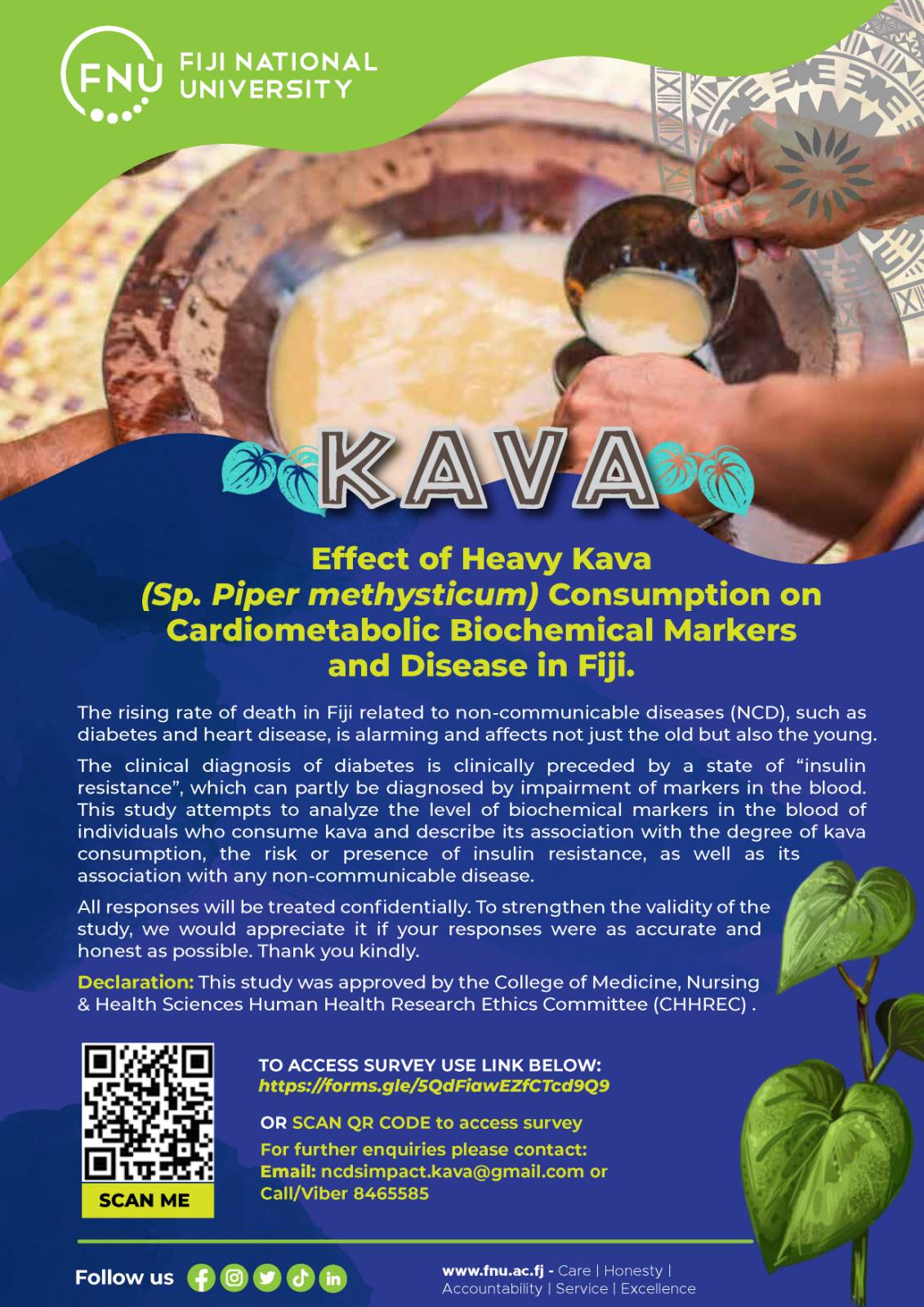
We encourage faculty, researchers, and students to contribute to our research efforts. Please take a moment to fill out our survey:
👉 Click here to access the survey form
Your input will help us improve and expand our research initiatives. Thank you for your participation!
The Pacific Sexual & Reproductive Health Research Centre (PacS-RHRC) represents a new and dynamic approach to the Sexual & Reproductive Health (SRH) research issues and challenges of the Pacific Island Countries. In keeping with the Pacific move towards integration of HIV & STI into the larger SRH agenda, PacS-RHRC, in the College of Medicine, Nursing & Health Sciences (CMNHS), Fiji National University, is dedicated to:
PacS-RHRC will fulfill its roles to the best of its ability to CMNHS, FNU and the wider Pacific Islands in several ways:
PacS-RHRC collaborating Partners
PacS-RHRC will conduct research and disseminate findings independently or work in partnership with collaborating such as academic, technical, donor, NGOs institutions, and other key stakeholders such as governments and special communities in the Pacific Islands Countries & Territories. PacS-RHRC currently enjoys the support and collaboration of a group of regional and international community, technical and academic institutions such as the United Nations Population Fund (UNFPA) through its Western Pacific Office, Suva; International Planned Parenthood (IPPF) through its Pacific Office in Suva, the Secretariat of the Pacific Community (SPC) through its Public Health Program, based in Suva, Pacific AIDS Foundation (PIAF), the Oceania Society for Sexual Health & HIV Medicine (OSSHHM), and the Women’s & Children’s Health Knowledge Hub (Crossmap) a partnership between Burnet Institute’s Centre for International Health, the Menzies School of Health Research in Darwin, and the Centre for International Child Health at the University of Melbourne. PacS-RHRC is keen to develop collaborating networks for the development and advancement of SRH research and capacity at CMNHS, FNU and the Pacific region.
PacS-RHRC Research Areas & Interests
PacS-RHRC is a Pacific regional organisation and will conduct research in the Pacific region on the following issues:
CONTACT US:
Dr Kesaia Nawaqaliva
Research Coordinator
Email: kesaia.nawaqaliva@fnu.ac.fj
For more information on what we do, access CMNHS Research online at www.fnu.ac.fj
Pacific Planetary Health Research Centre, known in our Fijian context and socialized as Tadra Vanua. The concept represents our land, our seas, our people, and our culture as an inseparable whole. Tadra, meaning ‘dream,’ joins with Vanua to express our collective dream for a healthier, more resilient future for our region and beyond.
The establishment of Tadra Vanua reflects a recognition that the time is now for the Pacific to lead the world in action-oriented research that integrates human, animal, and environmental health. This aligns with the aspirations of the Healthy Islands Vision, the Blue Pacific 2050 Strategy, SPC’s commitment to planetary health in their 10 year strategy, and the WHO Weaving Health for Families, Communities and Societies in the Western Pacific Region (2025–2029) Strategy. These global and regional mandates converge here, in the Pacific, where our political leaders have consistently called for urgent and unified action on health, climate, and the environment.
Tadra Vanua aspires to serve as a world-class research hub—a home for Pacific-led, place-based, interdisciplinary research and action. It will build on existing successes, such as the RISE and WISH projects, and will leverage partnerships with key regional and international stakeholders. This hub will unite the research capacities of the Fiji Institute of Pacific Health Research and other FNU centres, while working alongside institutions like the Pacific Community, the World Health Organization, and leading universities from Australia, New Zealand, and the national government.
Crucially, Tadra Vanua will not simply generate knowledge; it will drive action. It will work hand in hand with Pacific communities, governments, and civil society, ensuring that research translates into real-world solutions that prioritize the most vulnerable and safeguard our ecosystems and traditions.
Our vision is bold and long-term: a 10-year pathway with an initial five-year growth and proof-of-concept phase.
The objectives are clear:
Through this work, Tadra Vanua will position the Pacific as a global exemplar of integrative solutions to the health and environmental crises of our time. It can amplify our voices on the international stage, demonstrating that we are not merely vulnerable islands but innovative leaders driving transformative change.
POPULATION BASED-AGE STRATIFIED ASSESSMENT OF SARS- Cov2 SEROPOSITIVITY IN FIJI
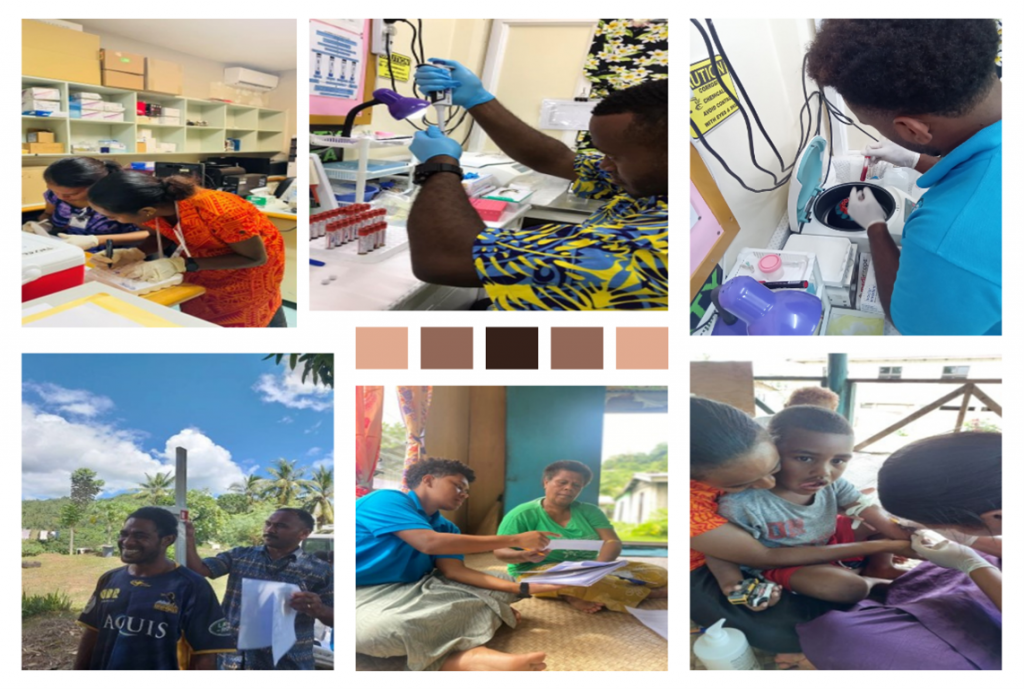
Fiji succumbed to the global COVID-19 pandemic in 2021 experiencing widespread community transmission with large waves of disease caused by different variants of the SARS-CoV2 virus that causes the disease. At the peak of COVID-19 transmission in the country, disease incidence in Fiji was amongst the highest in the world. By mid-2023 a total of 885 COVID-19 deaths had been recorded and although vaccination rates for the first two doses of COVID-19 vaccine were high, uptake of booster doses amongst high-risk groups has been variable. Although COVID-19 hospitalizations and mortality have reduced significantly since 2021 direct measures of population level immunity to the SARS-CoV2 virus are currently lacking. An understanding of population level immunity to SARS-CoV2 variants provides useful information for evaluating the impact of vaccination and informing the need for booster doses of vaccine. Serosurveys provide an opportunity to evaluate to determine exposure to specific antigens and also evaluate antibody responses to these antigens. These surveys identify a sample of the population and collect blood specimens which are then evaluated at a medical laboratory for the presence of specific markers of previous infection and of immunity.
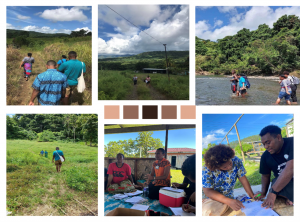
In 2022, with support from the Fiji Ministry of Health and Medical Services, the Communicable Disease Research Centre (CDRC) of the Fiji Institute of Pacific Health Research launched the Population based Age stratified assessment of SARS-CoV2 Seropositivity in Fiji Project or PASS Fiji Project (link to FNU page with launch). This project is funded by the Australian Department of Foreign Affairs and Trade (DFAT) and will directly assess population exposure and immunity to SARS-CoV2 from 2022-2024 in alignment with the WHO Unity Protocol for SARS-COV2 serosurveys. The PASS Fiji Project includes two separate research studies and the establishment of a serology laboratory for research at the College of Medicine, Nursing and Health Sciences. Technical support for the study is being provided by the University of Otago through its existing affiliation with the CDRC and also by the University of Auckland.
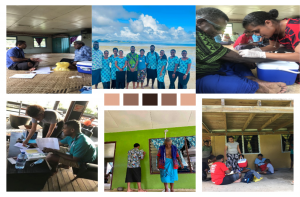
In early 2023 the PASS Fiji project began recruitment for its two research studies. The first study involves repeat cross-sectional surveys of the population examining the proportion of Fijians who test positive for previous exposure to SARS-CoV2 and, the strength of antibody responses in these. The second study involves the follow-up of people receiving booster doses of COVID-19 vaccine to determine changes in antibody responses following booster vaccination. In August 2023, the FNU Container Serology Laboratory was opened (Insert link to story/blog). This laboratory facility will be used initially for PASS Fiji studies but will enable medical laboratory research to be conducted at the Fiji National University for other staff and student research. The laboratory also provides a storage facility for biobanking of samples to enhance the research outputs of the institution. In 2024 the PASS Fiji project will release results from the first survey to provide an assessment of population level immunity to SARS-COV2 in Fiji.
PASS Fiji Study Prelim Findings Study English Final
PASS Fiji Infographic Fijian Final
PASS Fiji Infographic English Final
PASS FIJI FIELD BLOGWEBSITE English Final
Meet the CDRC Staff
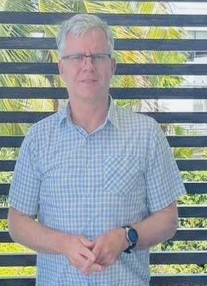
Professor Philip Hill
Adjunct Professor
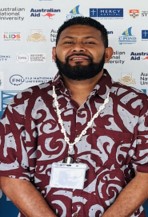
Mr. Isireli Koroituku
Research Fellow – CDRC
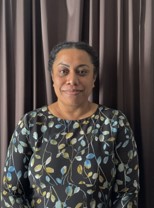
Dr. Anaseini Ratu
Study Coordinator – PASS Fiji Project – CDRC
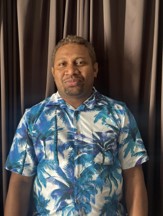
Mr. Viliame Qio
Project Manager – COVID-19 Grant
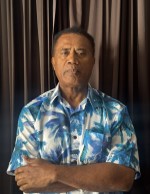
Mr. Uraia Rabuatoka
Senior Lab Technician – PASS Fiji
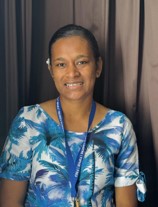
Mrs. Venina Naigulevu
Research Assistant – Pacific Health Observatory
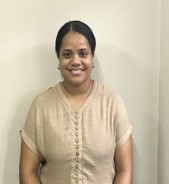
Ms. Salote Uluinabou
Research Assistant – Long-COVID Study
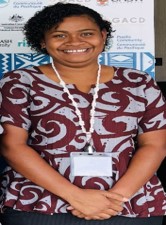
Ms. Luse Lauci
Research Assistant – PASS Fiji
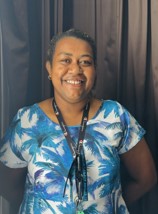
Ms. Reapi Seru
Research Assistant – PASS Fiji
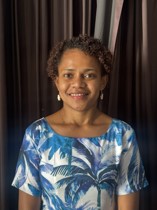
Ms. Naina Cagi
Lab Techinican – PASS Fiji

Ms. Chloe Ravunisa
Research Assistant – Long-COVID Study
The Watershed Interventions for Systems Health in Fiji- WISH Fiji
Background:
The condition of ecological watersheds affects the health of people and the downstream environments in which they live. Higher incidences of water-related bacterial diseases like typhoid and leptospirosis occur within watersheds that have large tracts of cleared land and higher densities of livestock accessing waterways. In addition, watershed alterations that promote flooding and standing water can accelerate mosquito-borne dengue transmission within rural communities. These same activities increase the amounts of sediments and nutrients entering waterways, with devastating impacts on freshwater and coastal coral reef ecosystems and thus the food, livelihoods and cultural practices of local people. Targeted watershed interventions and water management practices reduce water-related disease risk, improve downstream ecosystem condition and support overall system health.
Purpose:
The Watershed Interventions for Systems Health in Fiji (WISH Fiji) project embraces this integrated approach, working with national and local government, rural communities and the commercial sector to reduce infection risk and improve health and well-being within five river sub-catchments areas in Fiji. We are transforming action from reactive to preventative, improving the ability of integrated systems to predict, prevent, respond and recover from water-related infectious diseases and natural disasters.
Aim:
Scope of work:
The research works in the sub-catchments of Dawasamu, Waibula, Upper Navua, Bureta and Dama to:
Partners:
WISH Fiji is collaboration between the University of Sydney, Edith Cowan University, Fiji National University, and the Wildlife Conservation Society, in partnership with the Fiji Ministry of Health and Medical Services, Water Authority of Fiji, Pacific Community, UNICEF and World Health Organization.
Link to Official Website: https://wishfiji.sydney.edu.au/
Revitalising Informal Settlements and their Environments (RISE)
Background
RISE is a transdisciplinary research program working at the intersections of health, environment, and water and sanitation. RISE is trialling a new water sensitive approach to water and sanitation management in 24 informal settlements across Makassar, Indonesia and Suva, Fiji. Working with communities, governments, local leaders and partner institutions, RISE is co-designing location-specific solutions that integrate green infrastructure, such as constructed wetlands, to strengthen the whole-of-life water and sanitation cycle. Underpinned by the emerging discipline of ‘planetary health’, RISE success will be measured by the health and well-being of residents – particularly children under five years of age – and the ecological diversity of the surrounding environment.
Vision
Our vision is to transform human and environmental health in urban informal settlements through water-sensitive revitalisation.
Objectives
RISE aims to enable these communities to:
Benefits:
We anticipate multiple benefits:
Scope of work:
Working with communities, governments, local leaders and partner institutions, RISE aims to demonstrate that nature-based solutions – such as wetlands and bio-filtration gardens – can deliver sustainable, cost-effective health and environmental improvements for those living in informal settlements.
RISE is conducting a randomised control trial (RCT) involving 12 informal settlements in Suva, Fiji and 12 in Makassar, Indonesia. In the first phase of the trial, six settlements in each country are undergoing a water and sanitation upgrade. The impacts of the upgrades on the health of the environment and the health of the communities will be monitored, and compared against the other six settlements in each country.
In the second phase of the trial, the other six settlements in each country will be upgraded.
Partners:
RISE is led by the Monash Sustainable Development Institute, and brings expertise from across six Monash faculties: Art, Design and Architecture; Science; Medicine, Nursing and Health Sciences; Engineering; Business and Economics; and Law.
The Wellcome Trust provides core funding for the research components of RISE. The New Zealand Ministry of Foreign Affairs and Trade funds the infrastructure intervention in Fiji, and the Australian Department of Foreign Affairs and Trade funds the infrastructure intervention in Indonesia.
In Fiji, the RISE intervention is led by the Ministry of Housing and Community Development and the Water Authority of Fiji, and the research is led by Fiji National University, with support from the University of the South Pacific. Live & Learn Environmental Education implements the RISE Fiji program across both the intervention and research.
Link to Official RISE website https://www.rise-program.org/about#